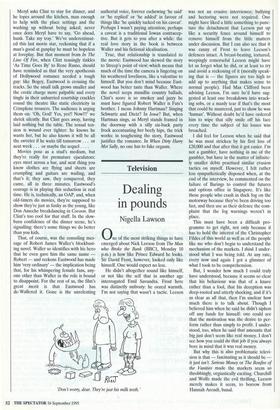Television
Dealing in pounds
Nigella Lawson
One of the most striking things to have emerged about Nick Leeson from The Man who Broke the Bank (BBC1, Monday 10 p.m.) is how like Prince Edward he looks. Sir David Frost, however, looked only like himself. One would expect no less.
He didn't altogether sound like himself, or not like the self that in another age interrogated Emil Savundra. Frost here was distinctly unfrosty: he oozed warmth. I'm not saying that wasn't a tactic. Leeson `Don't worry, dear. They're just his milk teeth.' was not an evasive interviewee; bullying and hectoring were not required. One might have liked a little something to punc- ture the detachment that Leeson put up like a security fence around himself to remove himself from the little matters under discussion. But I can also see that it was canny of Frost to leave Leeson's defences intact. A breast-beating, tortured, weepingly remorseful Leeson might have let us forget what he did, or at least to try and avoid a reckoning of it (morally speak- ing that is — the figures are too high to add up to anything that makes sense to normal people). Had Max Clifford been advising Leeson, I'm sure he'd have sug- gested at least one breakdown into wrack- ing sobs, or a manly tear if that's the most that could be mustered, just to show he was `human'. Without doubt he'd have ordered him to wipe that silly smile off his face every time the subject of his losses was broached.
I did feel for Leeson when he said that he was most stricken by his first loss of £20,000 and that after that it got easier. I'm not a gambler, have nothing in me of the gambler, but have in the matter of infinite- ly smaller debts practised similar evasion tactics on myself. However, I felt rather less sympathetically disposed when, at the end of the interview, he commented on the failure of Barings to control the futures and options office in Singapore. It's like those people who crash in thick fog on the motorway because they've been driving too fast, and then use as their defence the com- plaint that the fog warnings weren't in place.
This must have been a difficult pro- gramme to get right, not only because it has to hold the interest of the Christopher Fildes of this world as well as of the people like me who don't begin to understand the mechanism of the markets. I think I under- stood what I was being told. At any rate, every now and again I got a glimmer of what I took to be comprehension.
But, I wonder how much I could truly have understood, because it seems so clear that his behaviour was that of a knave rather than a fool, that his deception was deep-rooted and utterly shocking, and if it's as clear as all that, then I'm unclear how much there is to talk about. Though I believed him when he said he didn't siphon off any funds for himself: one could see that the motivation was the desire to per- form rather than simply to profit. I under- stood, too, when he said that amounts that big just don't seem like real money. I don't see how you could do that job if you always bore in mind that it was real money.
But why this is also problematic televi- sion is that — fascinating as it should be - it just isn't. Serious Money or The Bonfire of the Vanities made the markets seem so throbbingly, orgiastically exciting. Churchill and Wolfe made the evil thrilling, Leeson merely makes it seem, to borrow from Hannah Arendt, banal.


































































 Previous page
Previous page